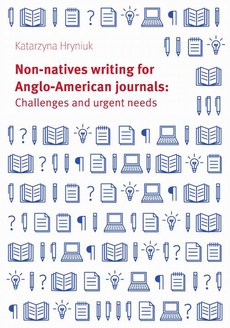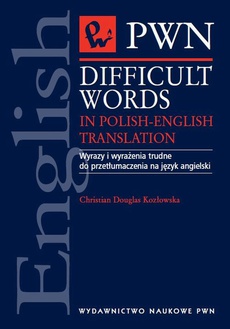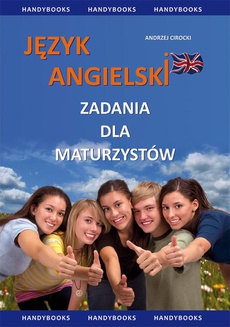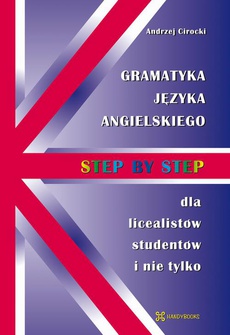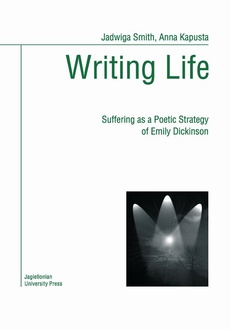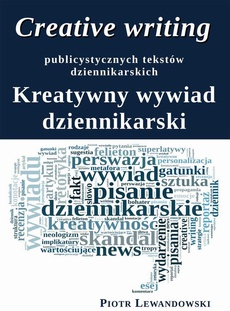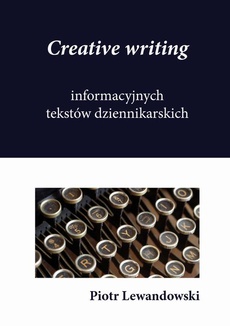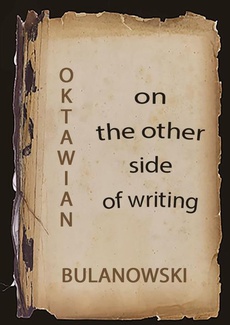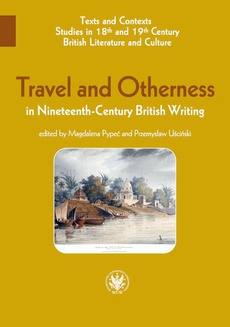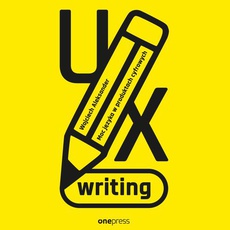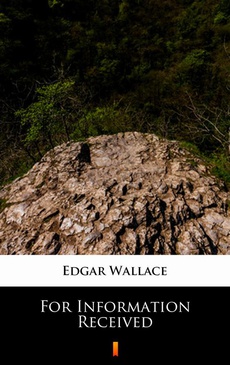POLECAMY
Non-natives writing for Anglo-American journals: Challenges and urgent needs
Autor:
Wydawca:
Format:
epub, mobi, pdf, ibuk
The author presents the problem of writing research articles in English as a foreign language by Polish scholars – specialists in linguistics and applied linguistics – for publication in Anglo-American journals.
In her book she explores which aspects of the process are the most challenging for the authors and what needs they have in this area. In the light of the current higher education reform and the new requirement of publishing in international journals, this issue is particularly important.
She presents the complex problem of the role of English as a global language in academic communication and the situation of scholars from Poland, a semiperiphery country, who by submitting papers to highly-ranked journals compete with the researchers from the world’s leading countries in this area. When faced with the new challenges, they need to have a highly developed competence of writing in line with the dominant Anglo-American conventions.
The author describes the problem presented in the book from a geopolitical point of view and considers the process of writing in English form a social, cognitive and rhetorical perspective. She also explores in detail the core of the issue in an empirical study and tries to diagnose what steps should be undertaken in order to facilitate the publication activities of Polish scholars at the highest international level.
*********
Autorka przedstawia zagadnienie pisania artykułów naukowych w języku angielskim jako obcym przez polskich naukowców – specjalistów w dziedzinie językoznawstwa i językoznawstwa stosowanego – w celu publikowania w anglo-amerykańskich czasopismach naukowych.
W swojej książce bada, jakie aspekty tego procesu stanowią dla autorów największe wyzwanie i jakie mają oni potrzeby w tym zakresie, zwłaszcza w świetle reformy szkolnictwa wyższego i stawianych przed pracownikami naukowymi nowych wymagań publikowania w czasopismach o zasięgu międzynarodowym.
Prezentuje złożoną problematykę roli języka angielskiego jako globalnego w komunikacji akademickiej i sytuację naukowców polskich pochodzących z kraju półperyferyjnego, którzy, chcąc publikować w prestiżowych czasopismach, współzawodniczą z badaczami z krajów znajdujących się w światowej czołówce. W obliczu nowych wyzwań, które stoją przed nimi, dysponowanie wysoko rozwiniętą kompetencją pisania zgodnie z dominującymi w tych periodykach konwencjami anglo-amerykańskimi jest koniecznością.
Autorka przedstawia poruszony w książce problem z geopolitycznego punktu widzenia oraz rozważa proces pisania w języku angielskim na płaszczyźnie społecznej, kognitywnej i retorycznej, aby następnie szczegółowo zgłębić istotę tego zagadnienia w badaniu empirycznym i zdiagnozować, jakie kroki powinny zostać podjęte, aby usprawnić działalność publikacyjną polskich badaczy na najwyższym światowym poziomie.
*********
Katarzyna Hryniuk – is Assistant Professor in the Institute of English Studies at the University of Warsaw where she teaches undergraduate and graduate courses and seminars. She specializes in applied linguistics, foreign language learning and teaching in particular. Her main research interests are: the development of writing in English as a foreign language, teacher training, and comparing Polish and Anglo-American conventions of academic writing. In the academic year 2012/2013 she was awarded a grant by the Polish-U.S. Fulbright Commission and stayed at Indiana University-Purdue University Indianapolis. She has published articles in book volumes with publishers such as Peter Lang, Springer, Routledge, and in local and international journals (e.g., International Journal of Applied Linguistics, Studies in Second Language Learning and Teaching, Research in Language).
Katarzyna Hryniuk – adiunkt w Instytucie Anglistyki Uniwersytetu Warszawskiego, gdzie prowadzi kursy oraz seminaria licencjackie i magisterskie. Specjalizuje się w językoznawstwie stosowanym, w szczególności w dydaktyce języków obcych. Jej główne zainteresowania badawcze to rozwijanie sprawności pisania w języku angielskim jako obcym i szkolenie nauczycieli w tym zakresie oraz polskie i anglo-amerykańskie konwencje pisarstwa akademickiego. W roku akademickim 2012/2013 przebywała na stypendium Polsko-Amerykańskiej Komisji Fulbrighta na Indiana University-Purdue University Indianapolis. Publikowała m.in. w takich wydawnictwach jak Peter Lang, Springer, Routledge oraz w lokalnych i międzynarodowych czasopismach naukowych (np. International Journal of Applied Linguistics, Studies in Second Language Learning and Teaching, Research in Language).
| Rok wydania | 2019 |
|---|---|
| Liczba stron | 172 |
| Kategoria | Język angielski |
| Wydawca | Uniwersytet Warszawski |
| ISBN-13 | 978-83-235-3685-7 |
| Numer wydania | 1 |
| Język publikacji | polski |
| Informacja o sprzedawcy | ePWN sp. z o.o. |
Ciekawe propozycje
Spis treści
| Introduction | 7 |
| C h a p t e r 1. English as the leading language of academic communication worldwide 11 | |
| 1.1. World Englishes and the problem of standards | 11 |
| 1.2. English as a global language, linguistic | |
| imperialism, and World English | 15 |
| 1.3. Upsides and downsides of the dominance of | |
| English in scholarship | 22 |
| 1.4. Poland as a semiperiphery country and | |
| Anglophone-center publications | 27 |
| 1.5. Two main roles of English in academic | |
| publications | 29 |
| C h a p t e r 2. Written academic discourse and its composition 33 | |
| 2.1. Defining academic discourse | 33 |
| 2.2. Analyzing academic discourse: The main paradigms | |
| 38 | |
| 2.3. The genre of a research article | 40 |
| 2.4. The characteristics of a research article in | |
| linguistics and applied linguistics | 43 |
| 2.5. Culture-specific differences in research | |
| article writing | 48 |
| 2.6. Academic writing as a cognitive, sociocognitive | |
| and sociocultural process | 52 |
| C h a p t e r 3. Writing for publishing in international and local journals 55 | |
| 3.1. The main determinant of the number of | |
| international publications | 55 |
| 3.2. Evaluation of academic work based on publishing | |
| output | 57 |
| 3.3. Gatekeeping practices and non-discoursive | |
| obstacles | 59 |
| 3.4. Publishing in local journals | 61 |
| C h a p t e r 4. Research on English as a foreign language academic writing by Polish scholars: The main problems explored 67 | |
| 4.1. The impact of research on foreign language | |
| academic writing on the area of second language | |
| academic writing | 67 |
| 4.2. Foreign language academic writing explored by | |
| Polish researchers | 68 |
| 4.2.1. Comparative analyses of academic texts | 69 |
| 4.2.2. Negative attitude towards developing the | |
| writing skill | 70 |
| 4.2.3. Research focusing on the process of writing | |
| 72 | |
| 4.2.4. Research on the epistemic function of | |
| writing | 75 |
| 4.2.5. Academic writing to learn language and | |
| content | 77 |
| 4.2.6. Other directions of academic writing | |
| research by Polish scholars | 78 |
| C h a p t e r 5. The study 87 | |
| 5.1. The background of the study | 87 |
| 5.2. The aim and the research questions | 89 |
| 5.3. The method | 90 |
| 5.3.1. Description of the tool | 92 |
| 5.3.2. The characteristics of research articles | 94 |
| 5.4. The participants | 95 |
| 5.5. The procedure | 96 |
| 5.6. Results | 97 |
| 5.6.1. The system of evaluation of academic work | |
| based on publications in highly-rated journals | 97 |
| 5.6.2. The double-blind peer review system | 101 |
| 5.6.3. Publishing in local journals, in the | |
| scholars’ mother tongue in particular | 104 |
| 5.6.4. Writing for international versus local | |
| journals in terms of effortfulness | 106 |
| 5.6.5. Native English speakers’ privilege and non- | |
| native speakers’ advantages in writing for | |
| publishing | 107 |
| 5.6.6. Discoursive and non-discoursive obstacles | |
| researchers face when publishing papers and ways | |
| of overcoming them | 110 |
| 5.6.7. The attitude, work and comments of the | |
| reviewers and other publication staff | 112 |
| 5.6.8. The aspects of the text that were mostly | |
| focused on in the reviews | 114 |
| 5.6.9. The strongest point of the article: The | |
| main reason for the article being accepted | 116 |
| 5.6.10. The people who contributed to the success | |
| in publishing the article and the ways they helped | |
| 117 | |
| 5.6.11. A particularly challenging section of the | |
| article | 119 |
| 5.6.12. The use of authorial voice | 120 |
| 5.6.13. The use of hedges | 123 |
| 5.6.14. The use of evaluative language for | |
| claiming centrality | 125 |
| 5.6.15. The way the researchers learnt to write | |
| research articles | 127 |
| 5.7. Summary of interview findings | 131 |
| C h a p t e r 6. Conclusions and implications for instruction 135 | |
| Acknowledgments | 141 |
| Appendix | 143 |
| References | 145 |
| Index of names | 159 |
| Subject index | 163 |
| Streszczenie | 169 |

